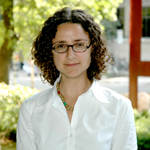
Emma Master earned a B.Sc. in Microbiology from McGill University in 1995, and a Ph.D. in Environmental Biochemistry from UBC in 2002. She then joined the Royal Institute of Technology in Stockholm, Sweden (KTH) as a Post-doctoral Fellow. There, she studied wood fibre biosynthesis and modification by carbohydrate-active enzymes and led the enzyme discovery and characterization group of KTH’s wood biotechnology division. In 2004, she joined the Fungal Genomics Project at Concordia University, before she became a faculty member in the Department of Chemical Engineering and Applied Chemistry at the University of Toronto in 2005. Emma Master received a Finnish Distinguished Fellowship (FiDiPro) in 2010 and an Early Researcher Award from the Ontario Ministry of Research and Innovation in 2009. She is a theme leader in the Canadian NSERC Bioconversion Network, and the Genome Canada project “BEEM: Bioproducts and Enzymes from Environmental Metagenomes”; she also leads “Forest FAB: Applied Genomics for Functionalized Fibre and Biochemicals”, a 4-year collaborative research program funded by the Ontario Ministry for Economic Development and Innovation.
